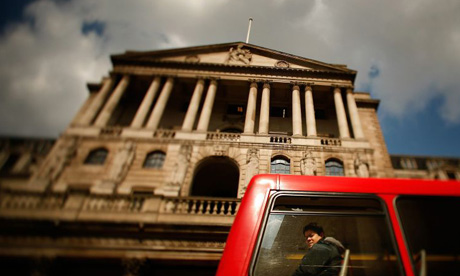Bank of England considers pumping billions more into economy
• Rates left at historic low of 0.5%
• Some economists call for more quantitative easing
- guardian.co.uk, Thursday 9 July 2009 12.16 BST
- Article history
The Bank of England today left interest on hold at a historic low of 0.5% but announced it would consider pumping even more money into the country's flagging economy.

The Bank of England left interest rates on hold again. Photograph: Peter Macdiarmid/Getty Images
The Bank of England today left interest on hold at a historic low of 0.5% but announced it would consider pumping even more money into the country's flagging economy.
The Bank, though, disappointed City analysts who had expected it to raise the volume of its quantitative easing (QE) programme from the current £125bn to £150bn, the maximum amount authorised by the government.
Some economists had called for the ceiling to be raised to as high as £200bn immediately in response to growing evidence that QE has not yet turned the economy round.
Markets reacted swiftly with dealers selling off government bonds, or gilts, in reaction to the fact that demand for them from the Bank will not rise immediately. The pound jumped to above $1.62 on the news and to over €1.16.
Rates have been at a record low since March, when the monetary policy committee embarked on QE, under which the Bank buys government bonds from private sector holders, thereby pushing money out into the economy.
But there has been growing concern that bank lending remains largely frozen, which could delay the economic recovery that policymakers are desperate to see.
The British Chambers of Commerce called for the level of QE to be raised. David Kern, the BCC's chief economist, said: "We disagree with the decision not to use the final £25 billion allotted to the asset purchase programme. Quantitative easing is not yet fully effective and there is a strong case for raising the proportion of private sector assets that the MPC purchases.
"It is important to significantly increase the programme's size, so as to underpin business confidence. We urge the chancellor to increase the ceiling for the programme by a further £50 billion, to £200 billion."
Ray Boulger of mortgage broker John Charcol said mortgage rates available to property buyers were going up as lenders sought to fatten their margins.
"Fixed rates were initially increased a month ago to reflect an increase in swap rates but have since not only not fallen back in line with swap rates but have risen further as lenders respond to increased demand by pushing rates up even more to deter business.
"This of course has the welcome benefit for lenders of increasing gross margins, which were already the highest they had enjoyed for years."
The TUC called on the government to take direct action to improve access to finance in the property market.
The TUC general secretary, Brendan Barber, said: "The credit crunch is continuing to depress the housing market, with access to mortgage finance returning at a snail's pace. The government needs to ensure that the banks increase the amount of mortgage funding available more quickly.

No comments:
Post a Comment